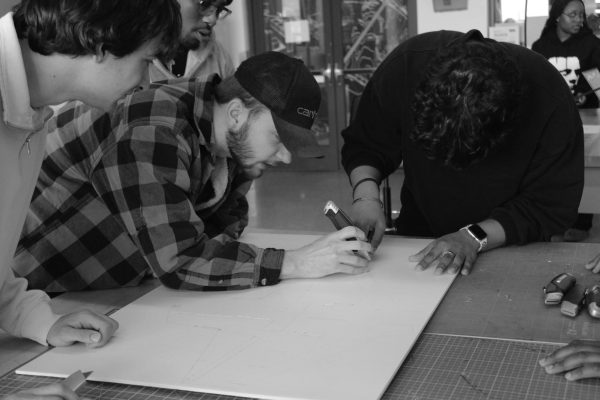University addresses air quality safety concerns
Students have been voicing a number of air quality concerns in university housing, both on and off-campus, for a number of semesters now.
Images shared by students on social media, only halfway into the first semester, have displayed large amounts of dust and debris clogging ventilation units, after taking them apart for cleaning.
One post, submitted anonymously to the Instagram account @unh_afterdark on Sept. 14, showed a student’s bathroom air vent that they removed. Inside, a large collection of mold was found. Comments under this post revealed more students’ concerns.
One read “No wonder why I’m always coughing in there,” while another shared a different story, saying, “we had moths living in our vents in cel last year lmao………. Help.”
The following day, another post was made of another anonymous student cleaning out what was identified as a Forest Hills Apartment air conditioning unit. The submission comment read “felt inspired by the last post and decided to clean my air conditioning vents in forest…figured out why i’ve been sick the last two weeks.”
In prior semesters, students have captured visible patches of black mold growing on walls and windowsills.
Recently, Associate Vice President for Facilities Lou Annino was contacted on the premises of student concerns arising from these incidents. Annino clarified that the university does not routinely test the air quality of residential properties, saying that “We test the indoor air quality in all spaces in the university where potential concern has been raised with air quality. We don’t test as a matter of routine.”
Concern being raised is constituted by “if there were a matter that came through Health Services, then we would test, but generally we would inspect and clean first.” Cleaning would, however, remove any proof of problematic elements, potentially.
“I don’t know that it’s necessarily factual, at least from where I sit, unless you have different information, to say that students have been sick,” he said when beginning to address concerns that students may be getting sick from conditions within their housing situations. “I don’t have any data to support that; it’s never been reported to me. Having said that, there are cases over the years that we have dealt with.”
He said that the foundation of clean spaces is “good quality maintenance systems.” These include cleaning and disinfecting routinely and changing filters in air systems. Filter changes are conducted at minimum biannually, he said.
“If there were a health concern, we would always encourage students to seek medical services first,” he said. “If there is a concern that is raised from our medical personnel, or from outside, but that’s not absolute either. If there were a physical concern that were identified, we would consider testing as well.”
He said “Students should report anything related to their health concerns directly to University Health Services.” Annino said if concerns are brought to health professionals who deem testing could be beneficial, then facilities will base their air inspections off of these suggestions or requests. Health concerns, he reiterated multiple times, should begin by being addressed from Health Services prior to contacting his office.
When they do test, they bring in an industrial hygienist, which is a lab technician who specializes in testing for molds and air quality in workplaces.
The results from any testing are reported back to Health Services and the Dean of Students Office, as well as any students involved in the concerns or impacted by any results.
Annino has no concerns about not routinely testing these factors. This is because, in his over ten years of working at the university, “there have only been two cases that I am aware of where we have identified potential hazards, and they were very quickly addressed and corrected. Two times in ten years, and multiple tests.”
“The underpinnings of all of these and why I have such a high degree of confidence is because at the same time that we are not doing routine testing, we are routinely evaluated on the quality of performance on our maintenance and on our cleaning programs…and we routinely score very high.”
“I don’t think it’s an under-representative number, but it wouldn’t be appropriate for me to say absolutely, there’s no other potential out there,” Annino said in regards to the two incidents being the only records of any concerns. “I can tell you that I have a very high sense that the university is doing a very good job in terms of being proactive; in terms of keeping our airline systems well-tuned.”

Mia Adduci is a senior studying communication concentrating in multi-platform journalism and media who began writing for the paper her first semester on...






